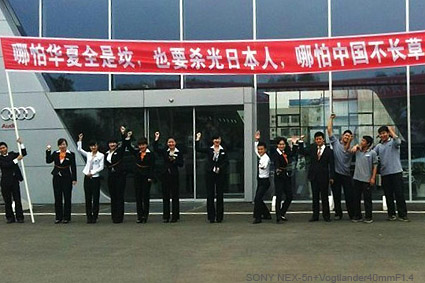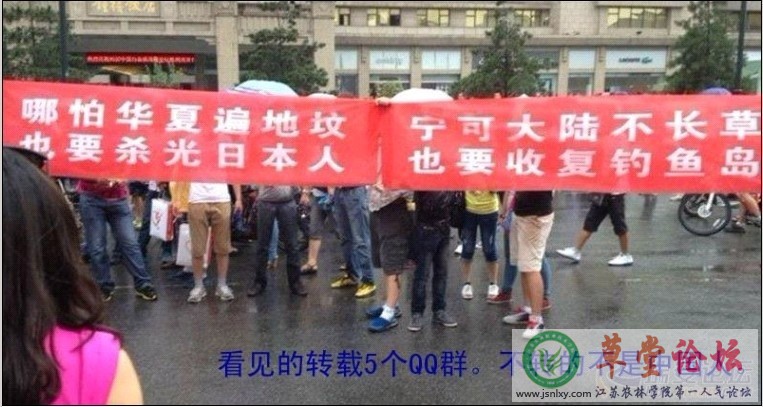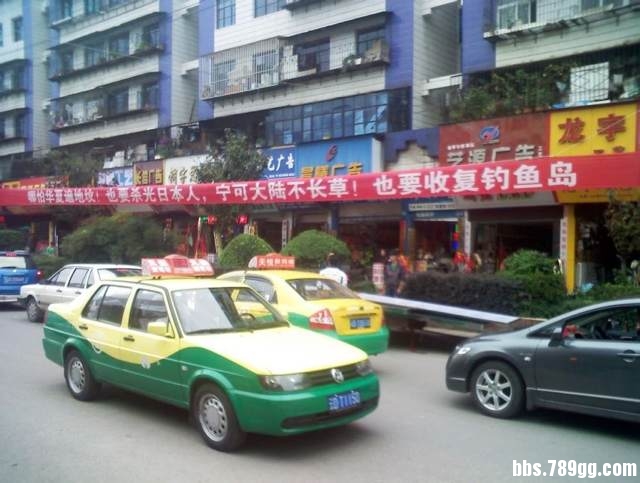"All Japanese must be killed"
« previous post | next post »
This photograph was sent to me by a colleague:

The slogan on the banner reads:
Nǎpà Huáxià quán shì fén, yěyào shā guāng Rìběn rén; nǎpà Zhōngguó bù zhǎng cǎo….
哪怕华夏全是坟,也要杀光日本人,哪怕中国不长草….
("Even if the whole of China is covered with tombs, [we] must kill all Japanese; even if no grass grows in China….")
Since this slogan is all over the web, it is easy to determine that the missing clause is
yěyào shōufù Diàoyúdǎo
也要收复钓 鱼岛
("we must recover Diaoyudao [the Senkakus]").
Thus, the complete banner would read:
Nǎpà Huáxià quán shì fén, yěyào shā guāng Rìběn rén; nǎpà Zhōngguó bù zhǎng cǎo, yěyào shōufù Diàoyúdǎo
哪怕华夏全是坟,也要杀光日本人; 哪怕中国不长草, 也要收复钓鱼岛
("Even if the whole of China is covered with tombs, [we] must kill all Japanese; even if no grass grows in China, we must recover Diaoyudao [the Senkakus]").
Aside from the blood-curdling sentiments expressed, I was struck by a number of linguistic features of the slogan. First of all, you will note that the couplets quaintly rhyme, and each line consists of seven syllables, so this is basically a heptasyllabic quatrain, which has roots that go far back in Chinese literary history. Furthermore, each line is divided by a caesura thus: 4-3. This too is a traditional type of prosody. The high degree of parallelism evident in the slogan is likewise typical of Chinese poetry. Also noteworthy is the use of Huáxià 华夏, an archaic, ethnically charged term, as a synonym for Zhōngguó 中国 ("Middle Kingdom; China"). What stands out most starkly, however, is the grammatical pattern employed:
nǎpà X 哪怕X… yěyào Y 也要Y…
("why fear X –> do not fear X; even if X… also must Y –> nevertheless / still must / have to Y…)
In some iterations of the slogan, the second nǎpà 哪怕 is replaced by nìngkě 宁可 ("would rather"), but the meaning remains the same.
When I teach Chinese languages, be they Mandarin or Classical Chinese or some other variety, I always emphasize such grammatical patterns as the key to mastering the structure of the language.
Although the government may be tolerating, sanctioning, or even promoting the proliferation of this slogan on the streets, there is some indication that internet censors are trying to limit its use, since many of the thousands of sites carrying this slogan that were yielded by a Google search have recently been scrubbed.
Is this a call for genocide?
I'm not sure what the significance is, but this particular photograph was taken outside of what appears to be an Audi dealership. Perhaps the staff members who are standing outside with their hands raised are trying to tell the mobs that have been going around smashing and burning Japanese automobile showrooms that they are patriotic Chinese who sell German cars. Incidentally, although the picture is too small to tell for sure, it seems that they are smiling and most have their raised hands clenched in a fist. The fellow in a white shirt near the middle adopts a martial arts pose, the better to attack the Japanese, I suppose.
Just as I was about to make this post, I found this photograph:
And this:
And lots of other instances of the display of this slogan. Thus, although the sentiments expressed may be extreme, they are by no means isolated. Indeed, for this slogan to have spread so widely without government intervention insures a high degree of organization and coordination from responsible units (dānwèi 单位).
[A tip of the hat to June Teufel Dreyer]


W. Sun said,
September 19, 2012 @ 4:12 pm
Found some longer versions in comments on related news:
"十亿青年十亿兵, 国耻岂待儿孙平。愿提十万虎狼旅, 跃马扬刀入东京!宁可大陆不长草,也要收复钓鱼岛,哪怕华夏遍地坟, 也要杀光日本人 但愿毛氏再出世,敢叫东洋葬汪洋,八年抗战日已降,如今岂能任猖狂,我辈血气方刚烈,莫忘先辈是炎黄!"
"十亿青年十亿兵, 国耻岂待儿孙平。 愿提十万虎狼旅, 跃马扬刀入东京! 宁可大陆不长草, 也要收复钓鱼岛; 哪怕华夏遍地坟, 也要杀到东京城,八年抗战日已降,如今岂能任猖狂,我辈血气方刚烈,莫忘先辈是炎黄;如今旧仇添新恨, 勿忘国耻当忠良!"
Victor Mair said,
September 19, 2012 @ 4:26 pm
@W. Sun
Thanks. Note the call for Mao to return.
Ian Provan said,
September 20, 2012 @ 12:09 am
A Chinese colleague tells me that people were carrying placards at the Beijing demonstrations that read "Kill all Japanese, take Aoi Sola alive" and "Diaoyu Islands belong to China, Aoi Sola belongs to the world" (Aoi Sola is a Japanese porn star with a large following in China).
David Moser said,
September 20, 2012 @ 2:23 am
"Aside from the blood-curdling sentiments expressed, I was struck by a number of linguistic features of the slogan."
All this reminds me of a spoof of a William Safire column (from National Lampoon, I think, 1970s or so), in which Safire, with cold academic objectivity, analyzes the linguistic nuances of various synonymous phrases for "Kill all the Negroes", such as "Off the jungle bunnies" etc., while never commenting on the horrifically racist meaning of the sentences. That's not what we're doing here, or course, but I'm sure some of these protesters would find it odd that a group of linguists are seriously analyzing the form of their banners, aside from the content. (And, somewhat related to this, I enjoy reading some linguistics papers from the 1960s, in which left-leaning professors would strew their papers with sample sentences like "Nixon says he is not a crook," or "Johnson lied the American people into Viet Nam." You don't see this much any more.)
George said,
September 20, 2012 @ 7:56 am
@David Moser, re your politically charged linguistics papers from the '60s, I can remember being given 'intellectuel de gauche' as an example of 'un pléonasme' and 'intellectuel de droite' as an example of an 'un oxymoron' by a French professor in the late '80s. But that's France I guess.
Observation said,
September 20, 2012 @ 8:14 am
I really like the slogan – the sentiments may be a little extreme, but it's really catchy. I have a question: why the strange punctuation on the third picture? Did something go wrong with the punctuation when they made that banner, or is it something I don't understand?
Nik said,
September 20, 2012 @ 11:11 am
So they would all of them trade death (to all of them) for the island? Is this a firm deal? All of them, right? Where can I get a hotline to persuade the Japanese prime minister to give them the island?
Victor Mair said,
September 20, 2012 @ 11:22 am
@Observation
"a LITTLE extreme"? "REALLY CATCHY"?
To me it's utterly gruesome.
J.W. Brewer said,
September 20, 2012 @ 2:12 pm
I rather hope that back at Audi HQ in Germany some lawyers are having a conversation to the effect of "what do you mean, no one thought it was necessary to put a no-public-advocacy-of-genocide clause into our contracts with dealers in the PRC"?
joanne salton said,
September 20, 2012 @ 3:26 pm
The Korean chap who ran around recently with an anti-Japan banner about island sovereignty after winning olympic bronze (and was thus not allowed to collect his medal) used the excuse that since it was in Korean script nobody would understand. I feel the Chinese have the same ideas – they never imagine the world would notice and condemn these cheery banners meant really for internal consumption.
As to the linguistics, I agree with David – it's a bit much.
L said,
September 20, 2012 @ 4:01 pm
@Joanne Salton
Funny, idn't it?
Here they are, all worked up about English being used in China, never suspecting that outside of China, somebody might just read Chinese.
Mike E. said,
September 20, 2012 @ 7:00 pm
@Observation
. . . "a little extreme"
I'm not sure if that means the same thing on both sides of the Pond.
Are you a speaker of British English by any chance?
Victor Mair said,
September 21, 2012 @ 5:47 am
Here at Language Log, we analyze the linguistic features of signs displayed during the Arab Spring (Jasmine Revolution) and the Occupy Wall Street movement, the names of volcanoes in Iceland, mistranslations and mispronunciations in the media, and plenty of other newsworthy phenomena. Should the Chinese anti-Japanese slogans be exempt? If so, why? Because of their hideous sentiments? Because of their worse-than-doggerel quality? I think not, and many Language Log readers have told me that they appreciate learning, for example, about the grammatical patterns and prosody of these Chinese slogans.
Rodger C said,
September 21, 2012 @ 7:43 am
Even if our asses freeze,
We must kill the Japanese!
We must take back the Senkakus,
Though they're just a bunch of rocks!
Nick Lamb said,
September 21, 2012 @ 8:55 am
"[…] for this slogan to have spread so widely without government intervention insures a high degree of organization and coordination […]"
Is the word "insures" here a mistake, or a sense I'm not familiar with? I know that "to insure" can mean "to guarantee" but in a restricted sense which doesn't seem right here. I know that Americans sometimes use "insure" where I would choose "ensure" but again, that doesn't seem to quite fit. But it might just be me.
Victor Mair said,
September 21, 2012 @ 10:53 am
@Nick Lamb
Normally I would write "ensure", but it just came out that way.
http://www.thefreedictionary.com/insure
http://www.thefreedictionary.com/ensure
Dan Smith said,
September 29, 2012 @ 11:15 am
"… in which Safire, with cold academic objectivity, analyzes the linguistic nuances of various synonymous phrases "
Safire analyzing linguistic nuances – that's exceedingly difficult to imagine.
[(myl) Now, now…]
Identity Politics and the Art of Belonging | The Arts Pages said,
October 12, 2012 @ 5:19 am
[…] or the disputed island between China and Japan (that led to banners with the slogan "All Japanese Must Be Killed"), the conflagrations did not erupt out of thin air, but were the result of long hostilities […]